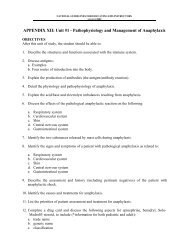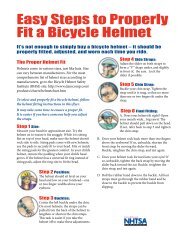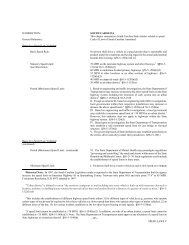The Criminal Justice System: A Guide for Law Enforcement ... - NHTSA
The Criminal Justice System: A Guide for Law Enforcement ... - NHTSA
The Criminal Justice System: A Guide for Law Enforcement ... - NHTSA
Create successful ePaper yourself
Turn your PDF publications into a flip-book with our unique Google optimized e-Paper software.
4. Discuss the details of the case and testimony with the prosecutor assigned to<br />
the case<br />
5. Make sure the prosecutor has been given copies of everything required by the<br />
law in your jurisdiction prior to trial (which may include handwritten notes,<br />
photographs, etc.)<br />
<strong>Guide</strong>lines <strong>for</strong> Testimony – What You Say and How You Say It<br />
During direct testimony, the officer’s responsibility is to present the facts of the<br />
case. Keep in mind—the officer saw and smelled it and the judge and jury did not.<br />
<strong>The</strong> officer must paint a mental picture <strong>for</strong> the judge and jury. In order to do that,<br />
the officer should:<br />
1. Testify to what he observed using language geared <strong>for</strong> the lay person – in<br />
other words, don’t use jargon, acronyms, or abbreviations;<br />
2. Never guess at an answer – it’s okay to say, “I don’t know” if you don’t<br />
know; and<br />
3. Provide specific descriptive details concerning exactly what the suspect did or<br />
was not able to do and explain what these actions mean.<br />
An officer’s testimony should NOT include:<br />
1. Testimony or evidence that has been excluded;<br />
2. Exaggerated testimony; or<br />
3. Testimony that can appear biased <strong>for</strong> or against the defendant.<br />
Professional conduct during a trial is very important. Jurors focus on an officer’s<br />
demeanor as well as the content of the testimony. Avoid becoming agitated or<br />
taking personal issue with defense tactics – just stick to the facts. Remember: the<br />
minute you lose your temper, you lose your audience.<br />
Personal appearance also matters. If you are a uni<strong>for</strong>med officer, wearing your<br />
uni<strong>for</strong>m to court is usually preferable to street clothes. If in civilian clothes, wear<br />
dress pants and jacket— with tie, if male.<br />
7
















